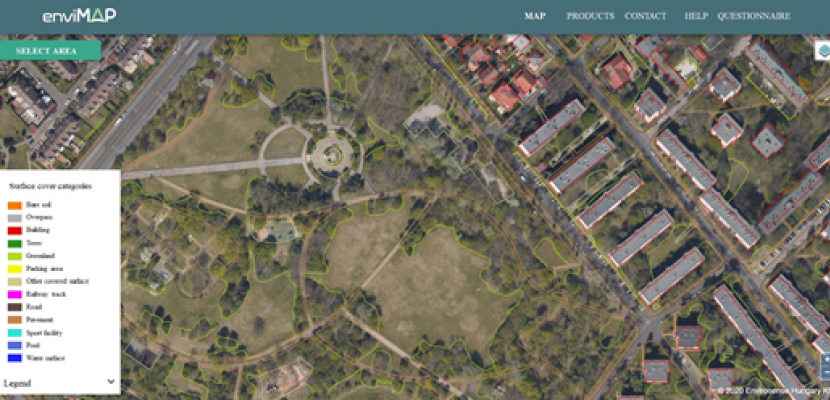Image

Creating a GIS system which is based on modern remote sensing methods and satellite data
Published on 01 April 2021

Hungary
This is the good practice's implementation level. It can be national, regional or local.
About this good practice
Post-socialist countries (thus Hungary) have undergone significant development since 1990, which affected our environment. Systems that form the basis of present-day urban and regional planning are outdated. To meet the challenges of the 21st century, municipalities/authorities need to set up new, modern methods. Based on remote sensing technology developed by Envirosense Hungary Ltd., the GIS system supports fact and data-based policy decision making.
This system could give an accurate picture of the actual state of green areas, urban spatial structure, building density etc. of a city. Time series analysis of satellite data show us how the urban structure has changed over time, thus trends can be identified, ongoing processes can be monitored. In the GIS system the spatial is complemented with attributive data (e.g. demography, POIs and institution locations, public transport network data, etc.) that gives the basis of several spatial analyses.
Having such a database which integrates existing city development and urban management data enables to gain exact information of the values and economic activities of peri-urban areas. These data are important to set the goals of a sustainable development strategy.
Envirosense Hungary Ltd. observed several major Hungarian cities and built up databases that have been contributing factors in urban planning and development (e.g. Budapest, Kecskemét, Érd etc.). Envirosense Hungary Ltd. operates in Debrecen.
This system could give an accurate picture of the actual state of green areas, urban spatial structure, building density etc. of a city. Time series analysis of satellite data show us how the urban structure has changed over time, thus trends can be identified, ongoing processes can be monitored. In the GIS system the spatial is complemented with attributive data (e.g. demography, POIs and institution locations, public transport network data, etc.) that gives the basis of several spatial analyses.
Having such a database which integrates existing city development and urban management data enables to gain exact information of the values and economic activities of peri-urban areas. These data are important to set the goals of a sustainable development strategy.
Envirosense Hungary Ltd. observed several major Hungarian cities and built up databases that have been contributing factors in urban planning and development (e.g. Budapest, Kecskemét, Érd etc.). Envirosense Hungary Ltd. operates in Debrecen.
Resources needed
Envirosense Hungary Ltd. can provide data processing and building the GIS database: 1 p. for support and helpdesk . Maintaining the system requires additional manpower from the municipalities: 2 p. from the municipality for system operation.
Monthly licence fee: 1500 EUR
Monthly licence fee: 1500 EUR
Evidence of success
1. Data-driven technology 2. Skilled experts.
3. R&D background; connection with the Univ. of Debrecen 4. Existing GIS systems in 12 Hungarian cities (including Debrecen)
5. The data has geodetic accuracy, environmental processes can be measured.
The technology used is up to date and constantly evolving.
Targets where remote sensing data and GIS have been applied after presenting the system in Debrecen: green cadastre, chimney cadastre, cemetery cadastre, online regulation plan
3. R&D background; connection with the Univ. of Debrecen 4. Existing GIS systems in 12 Hungarian cities (including Debrecen)
5. The data has geodetic accuracy, environmental processes can be measured.
The technology used is up to date and constantly evolving.
Targets where remote sensing data and GIS have been applied after presenting the system in Debrecen: green cadastre, chimney cadastre, cemetery cadastre, online regulation plan
Potential for learning or transfer
The success of using remote sensing data in decision making stands or falls on the transfer of information.By generating easy-to-understand information products, remote sensing become more tangible.Online platforms, map services where data can be filtered, analysed are great tools to support decision making.Although, aerial remote sensing data is not available for each area, satellite data that covers larger areas can be widely used for several analyses.Data processing routines are already developed they just have to be adapted to any certain area of interest.Municipality of Debrecen is committed to develop a GIS based decision support system, where all data will be channelled step by step to a database and online platform.The development of the system is already ongoing and the built framework is suitable to handle data for any municipality.Moreover, the flexibility of the framework gives the possibility for the implementation of new functions that are important for decision makers.
Further information
Website
Good practice owner
You can contact the good practice owner below for more detailed information.
Organisation
Envirosense Hungary Ltd.

Hungary
Észak-Alföld
Contact
Urban development expert
